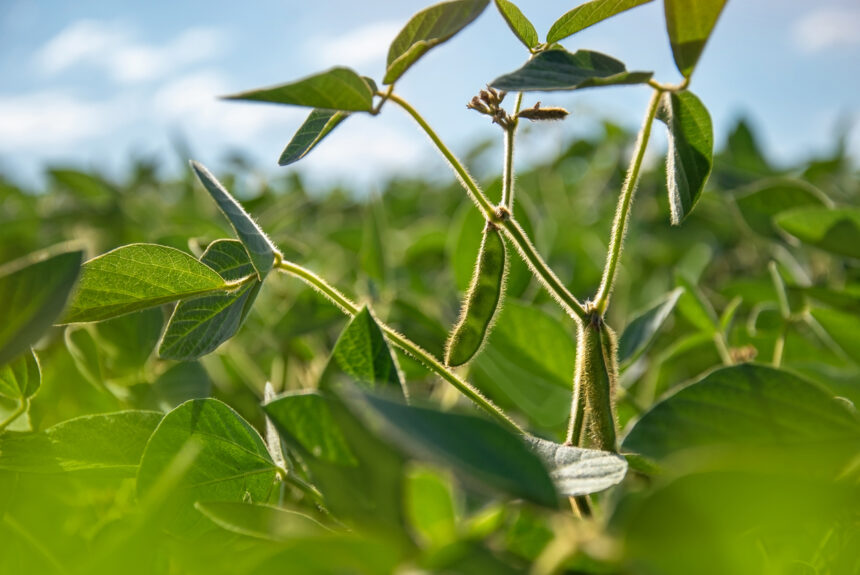Food waste is a prevalent and underreported problem in the agriculture industry. Consumers buying too much may be what first comes to mind when thinking about food waste, but a lot of food is also lost during production and transport. According to the United States Food and Agriculture Organization, up to 40% of the world’s crop supply is lost due to diseases and pests. Fighting this problem often leads to farmers increasing the use of fertilizers, 30% of which are over-applied, which leads to unnecessary environmental damage and agricultural runoff.
In an effort to improve efficiency and reduce the tremendous amount of waste associated with the sector, one California startup called InnerPlant has devised ‘talking’ plants that can communicate with farmers when stressed via a powerful mix of genetic engineering, remote sensing, and data science.
>>>READ: How Shade-Grown Coffee Can Save Our Mornings
InnerPlant’s smart seed technology utilizes fluorescents that generate a signal in the leaves within hours when a plant is under stress. This optical signal can be detected by camera-equipped tractors in the field, drones, or satellites in space. Depending on the exact ailment afflicting the crop (e.g. fungi, pests, drought, or nutrient stress), a different color is emitted. To the naked eye, a fluorescing Sensor Plant looks no different than a non-sensor plant. But with the right optical equipment (even an iPhone will do the trick!), the visual feedback emitted by a genetically-enhanced plant can be picked up –– and a precise treatment plan can be applied.
“As the plant is reacting to the stresses in your environment, like fungal pressure insects or nitrogen deficiency, it will start to signal and then we can help farmers understand what areas of the field need something and what areas are fine and don’t need additional chemicals,” said Shely Aronov, CEO of InnerPlant.
The precision agriculture technique has the potential to radically reduce emissions by improving efficiency gains from farming. Because InnerPlant’s biosensors can pinpoint the exact source of distress, farmers don’t have to waste their money on unnecessary biological treatments or risk over-applying pesticides, which can trickle down to our food system and pollute our waterways. The two most common agricultural inputs that tend to be overapplied are nitrogen and phosphorus. In the U.S., just over 70% of applied nitrogen is absorbed by crops. The rest is leaked as excess to the surrounding environment. Phosphorus use efficiency in the U.S. is higher; globally, however, efficiency rates of these two vital nutrients remain stubbornly low.
This is where InnerPlant’s technology can make a difference. By providing a targeted treatment, InnerPlant helps growers enhance their crop yields, thereby boosting efficiency and sustainability throughout the food production system. Additionally, by preventing farmers from over-applying harmful chemicals, the biotech addresses the industry’s waste problem and reduces its environmental impact.
Apart from its efficiency gains, the technology is also highly scalable, making it an attractive opportunity for investors.
“If you can get this technology into every single corn seed or soybean seed across North America and South America, that is many hundred millions of acres, and you can think about a few dollars per acre from a revenue perspective. That all of a sudden ends up in a lot of revenue for this business,” said Tom Biegala, founding partner of Bison Ventures, an InnerPlant investor.
>>>READ: Achieving Greater Food Security in a Changing Climate
In addition to Bison Ventures, the technology is backed by industry heavyweight John Deere, TAU Ventures, UpWest, MS&AD Ventures, and Bee Partners. InnerPlant has also received grants from the Wells Fargo Innovation Incubator and the United Soybean Board. Since its founding in 2018, the ag-tech startup has raised $22.3 million.
For now, the company is working on upending the North American soybean market, with plans to apply its precision agriculture technology to other common crops like cotton and corn in the near future.
According to Aronov, about 11% of crops in the U.S. fall prey to fungal diseases. By developing ‘talking’ crops that can communicate directly with their growers when needed, InnerPlant’s revolutionary sensing solution can help farmers reduce their pesticide usage and grow more food to feed American families, a win-win for the environment and agriculture alike.
Nathalie Voit is a freelance content creator and a graduate of the University of Florida. She is an alumni of The Heritage Foundation’s Young Leaders Program.
The views and opinions expressed are those of the author’s and do not necessarily reflect the official policy or position of C3.
